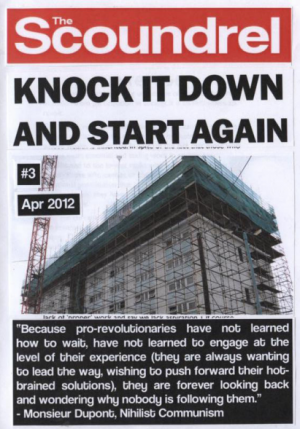From the thread on Nottingham Indymedia:
Nice one. Missed a few though
Published: April 05, 2012 19:25 by One of the Autonomous
Despite being part of one of the groups you give a little slap I’m glad this was put out there, and hope it’ll encourage more discussion and engagement within anarchist activity around the Notts area. I do wonder why some groups were ignored. No space for the academic anarchists or the been-there-seen-it-all anarcho-cynics? Two groups within the Nottingham anarcho-scene that are larger than A-fed or Autonomous, and have much stronger impact. East Midlands anti-fascists are also strangely absent.
Anyway, I’m sure those absences were due to time and space issues. And if I want something out there which has a critique of those groups I should do it myself rather than hope the scoundrel gets it done. All round though a decent read. Ta.
little to do? are you joking?
Published: April 05, 2012 21:58 by B
Whilst this piece addresses various shortcomings of “the anarchist scene”, I think it makes a grave mistake in generalising its conclusions. I don’t think anyone has really argued that the present “scene” was really going to catalyse a revolution, and many informed and politicised people act outside of any scene in any case, myself (partially) included.
For many revolutionaries ‘recruitment’ and ‘consciousness raising’ – which you identify as two primary follies – were never the mainstay of activity.
People don’t become politicised, or achieve ‘consciousness’ (or get recruited) by being lectured at. People learn through struggle. People build social organisation through struggle.
This happens day to day, as well as at times of major social conflict. I act as a rep in my (mainstream TUC) union branch. I show solidarity with people who have to attend sickness meetings, disciplinaries etc, at work. People are in conflict with the ruling class (even though they may not call it such) all the time.
It is by standing alongside people in struggle that we really win friends and influence people – not by lecturing them from a position of purity.
There is so much to do – so much at stake. How can you say there is very little to do?
People are loosing their jobs, their pensions, their services, their very right to remain here (in the case of people struggling against the racist immigration system).
There is very little we can do – are you joking?
“trying to get rid of the habits conditioned in us” just sounds like the kind of introspection and near narcissism that plagues anarchists. Live in a hippy cult why don’t you? Make yourself less like your working class neighbours.
Kicking leftists demagogues off the platform? – who’s being ideological now?
Self criticism begins at home.
Love to you nonetheless. Debate is good.
Thanks for the comments
Published: April 07, 2012 16:01 by T. Scoundrel
Thanks to those who’ve commented here. It’s good to have a conversation and I appreciate your input.
@One of the Autonomous
I’d be interested to print anything you write on the groups you’ve identified. The email address is on the main post so please send your thoughts.
@B
“Self-criticism begins at home”
Definitely. That’s why I wrote it.
“There is very little we can do – are you joking?”
I make a distinction between personal ethical choices that can reform the social and political superstructure and changes that can bring the downfall of the economic base on which they rest (old school Marxism aint been beat on this one). Yes, of course there is plenty we can do to change our personal lives and the lives of those we come across to improve our chances of survival and increase our comfort. We can boycott animal products, join a union, live in a housing co-op, help a refugee fight her legal case, etc. But none of those things fundamentally alter the circumstances which bring about animal abuse, class struggle, private ownership or forced migration. We are just sticking plasters on the gaping wound that is life under capitalism. We can make it slightly more pleasant and bearable within microcosms but our actions do not touch the base. That is what I mean by there not being anything we can do, not that I don’t think people should make ethical choices and foster mutual aid and solidarity where they can.
There is also a further ethical dilemma caused by the fact that some kinds of reform can actually take us further away from the revolutionary scenario we want to see. For example, an ongoing debate recurs within the No Borders network around the extent to which people put their energy into supporting individual migrants vs. fighting the border regime. The enforcement of border controls creates a constant flow of misery that would take us all a lifetime to undo and to care for those who have been damaged by it. It certainly seems to be an ethical choice to devote your life to doing that, but it would not fundamentally change the necessity of doing it. You could even say that, in some senses, migrant support is useful for the state, which can externalise the mopping up of its worst excesses to migrant support groups whilst it pursues its higher priority task of looking tough on immigration. So it is not a simple choice to make, where to put your ethical energies.
Most importantly to me, the fallback onto making ethical choices within a capitalist framework is an indicator of our powerlessness and should not be dressed up as anything more radical than choosing between Labour or Tories, iPhone or Android, etc. Whatever choice you make, capital’s dominance continues unaffected.
“People don’t become politicised, or achieve ‘consciousness’ (or get recruited) by being lectured at. People learn through struggle. People build social organisation through struggle.”
I make a distinction between consciousness and habit patterns (unconsciousness). The conscious level, for me, is useful for coming up with new ideas and theories *to be tested*. It is an experimental realm rather than one where hard and fast rules about the best course of action should emerge from.
The much more important level for determining how we behave and shaping the world is the level of conditioned habits and responses. This, for me, is where the habit of resistance and struggle can be cultivated or not. By habitually questioning authority and defying bosses, we can develop habits that will be useful once a crisis of capitalism occurs. I think these habits can only be developed out of self-interest e.g. workers’ desires for better conditions, fewer hours of work, increasing their power relative to that of their bosses, etc. Attempting to cultivate habits that give you no personal reward are like pissing in the wind. You quickly give up on it.
So, in short, I agree with you. The willingness to struggle is achieved through the practice of struggle. But that doesn’t stop plenty of politicos of all stripes thinking that they have the best method and trying to persuade other people to adopt it through conscious short-cuts. It doesn’t stop the SWP or the AF (or The Scoundrel) producing beginners guides to struggle in the vain hope that that the slow and individual process of habit formation can be substituted by ‘the right ideas’. Ditto for the political manifestos brought out by the Occupy movement, Earth First!, etc. So that is why I rant against the merchants of political ideologies and favour a laboratory of theories, that stand or fall by their applicability to practical situations.
““trying to get rid of the habits conditioned in us” just sounds like the kind of introspection and near narcissism that plagues anarchists. Live in a hippy cult why don’t you? Make yourself less like your working class neighbours.”
I think your use of the spooks “hippy cult” and an essentialised notion of the working class are stumbling blocks here. Do you really think we all need to be the same, whether donning flat caps and breeding whippets or drinking Stella and watching the footy? Does your idealised proletarian sneer at hippy cults because they are doomed to failure or simply because they are non-conformist? Does your working (wo)man also sneer at those who join unions and fight the bosses or is that acceptable proletarian activity? Sorry for the sarcasm, but I think pandering to stereotypes, if that is what you are suggesting, is a terrible idea. How long before we are also “speaking in a language they understand”?
The working class is defined by a social relation not by conformity to certain cultural norms. We are people who have to sell our labour to survive, because we don’t own the means of production. We come in all shapes, sizes and colours. Some of us like darts and some prefer cricket. I like European cinema, my neighbour prefers the X-Factor. We both have to get up and go to work in the morning.
The idea that being different to other people alienates them is a dodgy one, most often put into play by the type of conformists who are threatened by any social change and who willingly militate against it.
Habits are an individual’s conditioned reaction to the world. You can’t take the world bit out of that equation. Introspection and narcissism are no use in examining habitual responses to external forces and situations. That is, as you rightly point out, where many go wrong, thinking that they just have to have the ‘holiest’ ideas and that then they can do no wrong. To my mind, this is another example of ‘revolutionary consciousness’ creeping in and fucking things up.
I would class your support of class antagonism in your workplace as a way of breaking out of the ingrained habit of acquiescence in the face of attacks by bosses. Other examples could include sabotaging environmentally destructive corporations, redistributing wealth and ownership within a collective, fighting cops instead of obeying them or any other example that sustains and nurtures resistance to rather than acquiescence with the system.
But as I hope I’ve made clear, these are habits that can only have any impact once capitalism has reached a fatal crisis. Until that time we’re doomed to submit to it if we want to survive. That’s what I mean by “there’s nothing you can do”. It’s a hugely pessimistic position but sadly I think it’s correct.


